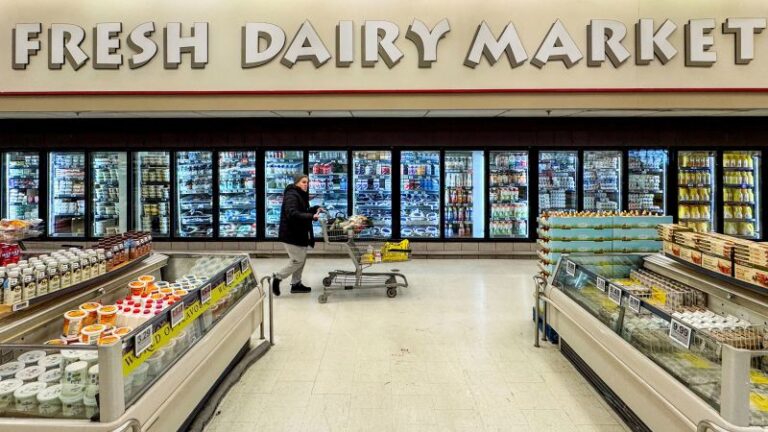Washington
CNN
—
President Donald Trump correctly noted Friday, as he has before, that Canada has tariffs above 200% on dairy products imported from the US. But Trump again failed to mention a critical fact.
Those high tariffs kick in only after the US has hit a certain Trump-negotiated quantity of tariff-free dairy sales to Canada each year – and as the US dairy industry acknowledges, the US is not hitting its allowed zero-tariff maximum in any category of dairy product.
In many categories, notably including milk, the US is not even at half of the zero-tariff maximum.
“In practice, these tariffs are not actually paid by anyone,” Al Mussell, an expert on Canadian agricultural trade, said in an email Friday.
Trump also made a claim that is simply false. He told reporters Friday that the situation with Canadian dairy tariffs was “well taken care of” at the time his first presidency ended, “but under Biden, they just kept raising it.”
In reality, Canada did not raise its dairy tariffs under then-President Joe Biden, as official Canadian documents show and industry groups on both sides of the border confirmed to CNN. The tariffs Trump was denouncing Friday were left in place by the United States-Mexico-Canada Agreement, or USMCA, which Trump negotiated, signed in 2018 and has since touted as “the best trade deal ever made.”
The White House did not respond to CNN’s Friday request for comment.
Trump vowed Friday to retaliate against Canada with new US dairy tariffs in the coming days, but Commerce Secretary Howard Lutnick said Sunday on NBC that the president’s response to Canada on dairy will actually come on April 2, the day Trump has said he will impose reciprocal tariffs on countries around the world.
Trump did achieve dairy concessions from Canada.
Canada has for decades irked US lawmakers with “supply management” policies that support Canadian farmers and protect its dairy, egg and poultry industries from foreign competition.
Under Trump’s USMCA, Canada guaranteed it wouldn’t apply any tariffs to specific amounts of US imports per year in 14 dairy categories, such as milk, cream, cheese, ice cream, butter and cream powder, and yogurt and buttermilk. These new US-specific quotas, which Canada agreed to increase over time, gave American farmers and companies more access to the Canadian market.
But the USMCA didn’t get Canada to lower the tariffs that apply to imports above the quota thresholds. And contrary to Trump’s Friday claim, those tariffs didn’t spike under Biden.
Mussell, senior research fellow at the Canadian Agri-Food Policy Institute and research lead at Agri-Food Economic Systems, pointed CNN to Canada’s published tariff lists for 2025, 2020 (the last calendar year of Trump’s first term) and 2017 (the first calendar year of Trump’s first term, before the USMCA was in place). They show the dairy tariff levels were the same each year for imports above the zero-tariff maximums – for example, 298.5% for above-maximum butter and 245.5% for above-maximum cheddar cheese.
Those tariff levels are eye-popping, and they certainly function as major trade barriers above the zero-tariff quota maximums. (Mussell noted: “The US has precisely this same system for its dairy market. It has tariff-rate quotas, and beyond that volume, very stiff tariffs and almost no imports.”) But the International Dairy Foods Association, which represents the American dairy manufacturing and marketing industry, pointed out Friday that the US is not at Canada’s zero-tariff maximum in any category.
Becky Rasdall Vargas, the organization’s senior vice president of trade and workforce policy, argued in an interview that Canada is to blame for the inability of the US to get to the maximums, saying Canada is unfairly deploying obstacles that make it “harder and harder” for the US to sell into the Canadian market. She said that while “we don’t love the tariffs,” the primary issue is that “we can never even fill the quota to begin with” because Canada is using administrative tactics to deny the US the market access it is supposed to have under the USMCA.
We won’t try to adjudicate this complex debate, which the Biden administration and the Canadian government battled out at a USMCA dispute resolution panel. Regardless, Trump’s assertion that Canada kept hiking its dairy tariffs when Biden was in charge is just not true.
Canada’s protectionism over its dairy, egg and poultry industries is an exception, not the norm.
The US Department of Agriculture notes on its website that under the North American Free Trade Agreement, or NAFTA, which preceded Trump’s USMCA, “almost all” US agricultural exports to Canada, and vice versa, faced no tariffs or quotas. The USMCA kept in place that zero-tariff, zero-quota trade while securing greater US access to the smattering of Canadian markets that are governed by supply management.
And while Trump claimed in February that “they don’t take our agricultural product for the most part,” Canada is actually the world’s second-largest export market for US agricultural products as a whole, according to the US Department of Agriculture, purchasing about $28.4 billion worth in 2024.
Canada is also the second-largest US export market for dairy, purchasing about $1.1 billion worth in 2024. That figure has grown steadily over the past decade, from about $625.5 million in 2015.


